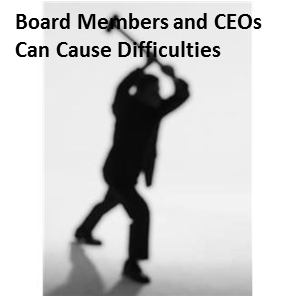Rogue Governors/CEOs and Responsibility of Governing Boards/Councils
They Do Exist
Many governing bodies like the world to think everything is great. Unfortunately, this is often far from the truth. Problems fail to be acknowledged or are hidden for a variety of reasons.
This article addresses how rogue governors and CEOs gain power, symptoms to note, and preventative measures boards/councils and governments can implement to avoid such situations.
How Rogue Governors and CEOs Gain Power

Rogue Governors and CEOs gain power under one or more unique circumstances. It is easy to gain power when board members are new and unaware of parameters of specific roles or when they are unfamiliar with current policies.
Keen governors and CEOs are astute. They know when board members are weak, have specific agendas, and when they are willing to go with the flow without question. They take advantage of this knowledge to form friendships, assert power, and make others feel they should listen to them.
Some have the attitude, “I will do what I want and ask for forgiveness later.” This works when boards are unclear about their role, are afraid to rock the boat, or are concerned about being ostracized if they bring up controversial topics.
It can also be difficult to argue with rogue CEOs or board members who believe they are more knowledgeable and point this out or make others feel inadequate if asked for information which they consider rudimentary or unnecessary.
These board members and CEOs like policies that are open to interpretation, are less likely to engage in planning and monitoring, and always have a reason why decisions were not made or actions not taken. There are many symptoms which may indicate that problems may arise in the future.
Symptoms
The follow list is not intended to be all inclusive but it does cover many signs which are worth noting
- Assuming unassigned power
- Acting as if being questioned is an atrocity
- Avoiding answering questions
- Always having a reason why something is not as outlined in the policies and protocols
- Blaming others
- Using friendships to override the need for accountability
- Attacking others when information is requested
- Coming late to meetings or leaving early
- Holding meetings outside formal meetings
10. Connecting with a select few to garner support for specific decisions prior to holding discussions with the full board/council
11. Acting as if the rules do not apply to him
12. Pointing out others faults and behaving as if he is beyond reproach
13. Speaking as if he has polled the majority of the constituents/shareholders when in fact he has only spoken to a select few
14. Refusing to look at the needs of those who would be marginalized by specific decisions, and/or
15. Using external connections to ensure his way is the only real choice.
When these signs are noted, the question remains, “So what can we do about this person?”
Prevention/Intervention
Many questions result when boards and councils have to deal with difficult Councillors/board members or CEOs. There are actions which can be taken to ensure that each person’s behavior and performance is kept in check. Listed below are seven of those actions.
- Ensure role descriptions are written behaviorally outlining parameters for performance and specific expectations
- Engage in a defined evaluation system which assesses the performance and expected behavior of the CEO and the board members/Councillors
- Design a behaviorally specific code of conduct and standards of behavior
- Outline the mechanism or process which will be used when behavior is not within the expectations of the council/board
- Specify when power can be withdrawn, by whom and how
- Ensure governance policies are specific, measurable and their effectiveness evaluated
- Outline conditions which would lead the council/board to question or investigate behavior
If board members are fearful about dealing with someone they like and respect, that is an issue for the board/council to discuss. Fear is not a reason to stop the work of the board/council and it only inhibits the board/council from achieving its mandate and leaving a positive legacy. It is too late when the issues become public, are discovered in an audit or are uncovered in a legal dispute.
Transparency and accountability are cornerstones of good governance. No one is exempt from scrutiny of some form- by regulators, auditors, public, shareholders, users, and/or customers.

